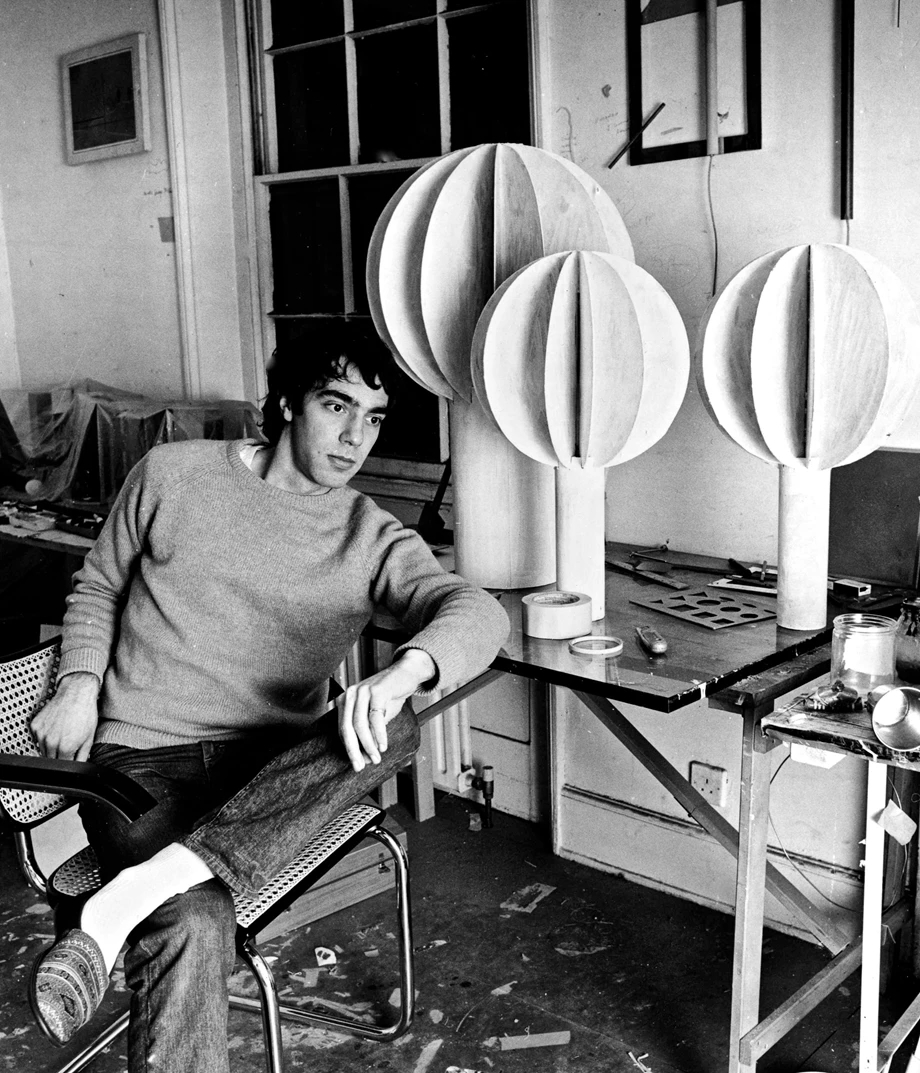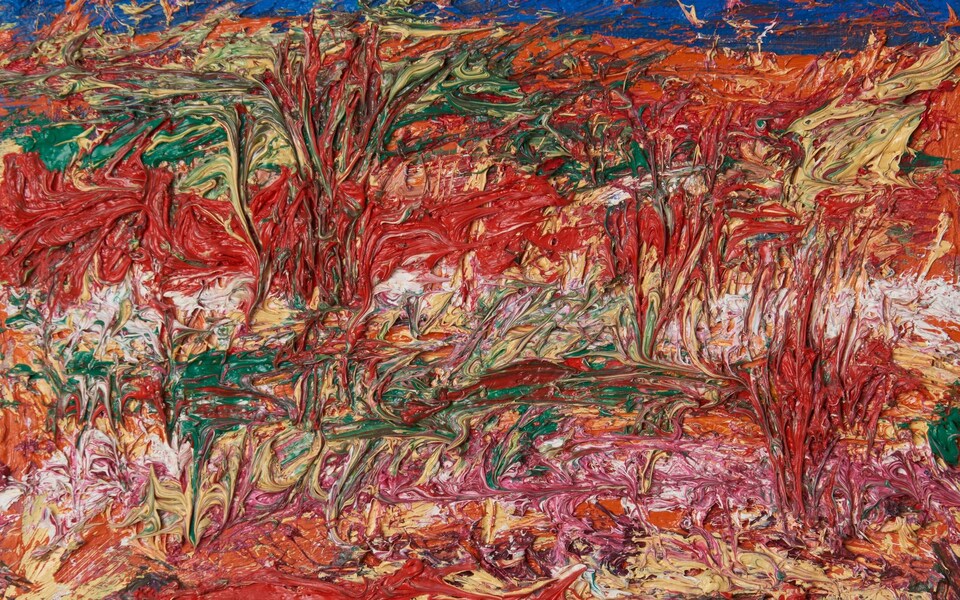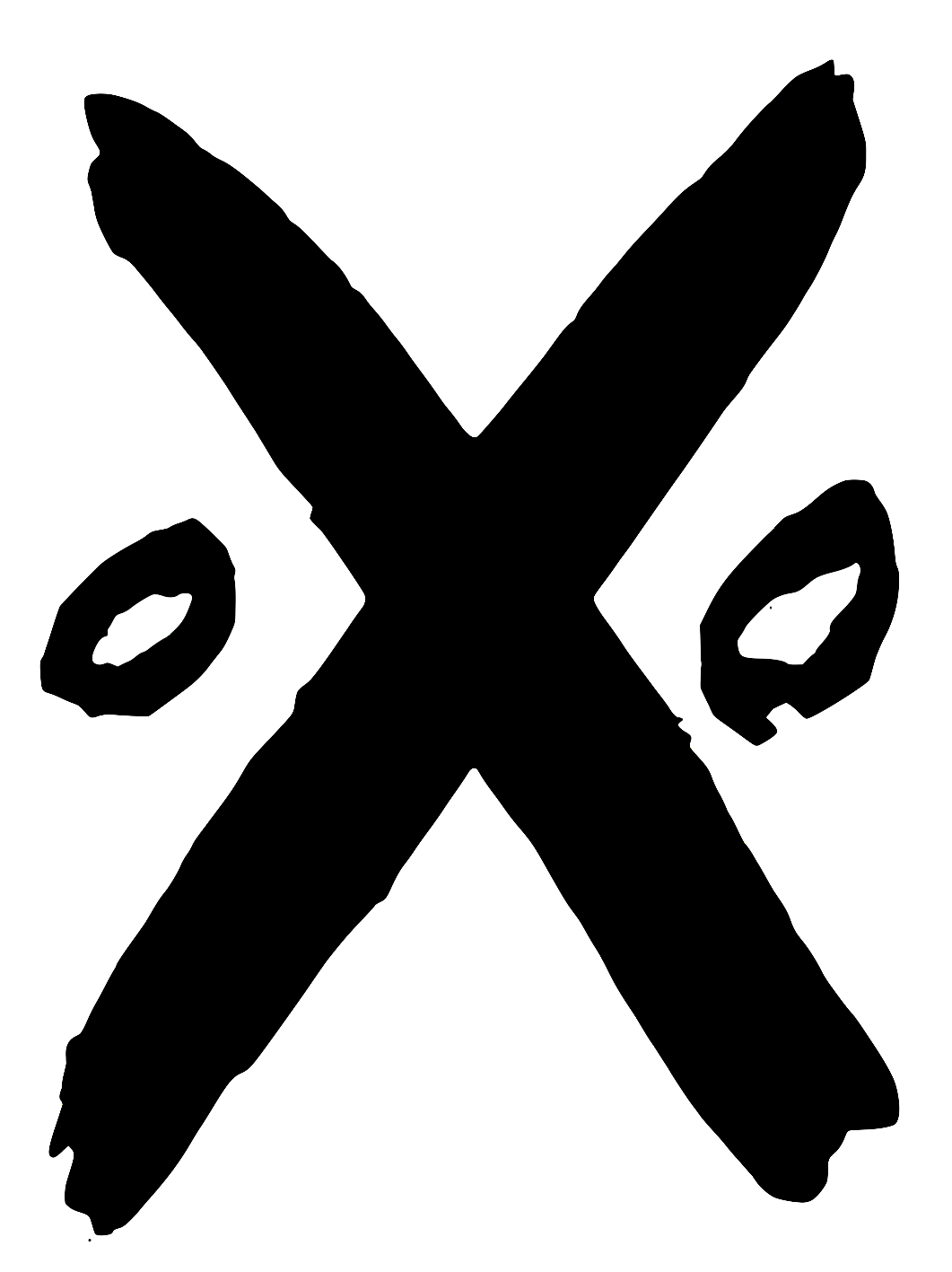Rehearsal / 2. Gareth Evans
![]()
![]()


Tell it in breaking England.
An afterword / an aside / On Derek Jarman’s Persistence of Vision.
There are some lines by Brecht, from his poem ‘To Those Born Later,’ written back in the pit of 1940, that are quoted more and more often now:
Indeed, and still true, but with a major caveat—now many of the horrors are happening also to the trees, and what strikes them makes our own plight so much the worse.
In bleak periods, some people say that art (define it how you wish) doesn’t matter. How can it, when compared to the lack of bread, heat, shelter? A false opposition, of course: those people have rarely experienced hardship. If they had, they would know that art matters the most precisely when everything beneath one’s feet is shaking. Out on the frayed edges of life, the fact of knowing that some have imagined both such scenarios and other worlds—of joy, coexistence, fecund and unfettered realms of collaborative being—is exactly what enables the enduring, the coming through.
Derek Jarman was canonised by gay male nuns, the Sisters of Perpetual Indulgence, on 22 September 1991. He described it as one of the most important events in his life. Now, more than thirty years later, he has become a part of England’s cultural canon, a ‘national treasure.’ That a radically queer, activist artist with a hugely prolific cross-disciplinary body of work can join such a lineage is both exhilarating and a warning. It shows how much the ‘Overton window’ of acceptance has broadened, but runs the risk of dilution, a soundbite softening of Jarman’s extraordinary artistic, political, sexual and social resonance, and relevance.
That is not to say that events marking his expanded status are without merit—far from it. Already this year, in what would have been Jarman’s 80th, we have seen major exhibitions and their attendant, finely produced catalogues (Protest! curated by Fiona Corridan and Jon Savage at Manchester Art Gallery, and Modern Nature curated by Philip Hoare with John Hansard Gallery), retrospective film programmes, shows internationally, and the publication of Pharmacopoeia (Vintage Classics), a carefully assembled ‘book of days,’ highlighting his writing on nature and gardening with the ‘white space’ devotion accorded to Zen koans or the many aphoristic volumes of philosophically sourced self-improvement. In authentic and significant ways, these suggest the diversity of identities and interests within the person we know as ‘Derek Jarman’ ... furious at injustice of all kinds and green-fingered; at once raging and meditative, triumphantly gay and honouring of a distinct lineage within ‘classical’ English literature.
Instinctively intersectional decades avant la lettre, Jarman demonstrated unequivocally that the work and the life are one and indivisible. He embodied his own creativity so fully, warmly and generously, that readers and audiences could legitimately feel that they ‘knew’ him through his making: certainly those to whom his example most mattered loved rather than simply admired him. [†] He showed what was possible if one fully trusted one’s imagination (and teased out the often undeclared skills of those with whom one worked).
![]()
![]()
(Left) Derek Jarman, The Garden (1990)
(Right) Derek Jarman, ‘Landscape,’ Detail (1991)
It is this endlessly fertile imagination that is fully on show here in his first—and only—prose fiction. From their own richly singular perspectives Michael Ginsborg, Philip Hoare, and Declan Wiffen brilliantly inform this foundational text, which sees Jarman—dreaming, scheming, proposing—lay out his stall. Known previously only to close friends, his insightful biographer Tony Peake and intrepid archive explorers, this wandering, wayward tale finds Jarman at his most youthfully spirited and speculative. It is a huge pleasure and a privelege to be able to publish it with House Sparrow Press for the first time.
In an era of ideologically fuelled culture wars and attacks on the very idea of the arts from the government and from managerially driven universities determined to marketise all that they touch, it is more important than ever to consider Jarman’s legacy, significance and influence while also celebrating how this remarkable life and work came into being. He shows us a more inclusive and internationalist, outward-looking England—one that acknowledges its own historical successes yet remains constantly vigilant regarding its oppressions, bigotries and flaws.
What the elder Jarman might have become we can only guess, but the young Derek we can meet now on these spirited pages and in his own miraculous reading, as if he was in the room with us.
Towards the grim, violent close of the 1930s Brecht also asked ...
To which he gave his own reply ...
We move forward by remembering what matters, and bringing it with us for the journey.
Onwards, through ...
† I experienced this in a very modest but unforgettable way when I attended the premiere of his film Wittgenstein at the Arts Cinema, Cambridge (a venue the philosopher had attended many times) on 30 January 1993, the day before what would be Jarman’s penultimate birthday. The auditorium was full beyond capacity. I moved towards my own reserved seat only to find it occupied. The man in it had his back to me and was talking animatedly to a person next to him. I gently made an interjection to the man, suggesting he was in my seat, and was appalled and terribly embarrassed to realise—when he turned around—it was Jarman himself, mid-interview for the student newspaper. His energy and charm completely belied his advanced condition. I apologised profusely but he told me not to worry at all and, as soon as they had finished, invited me to sit in the seat now vacant. After the film commenced, he stayed watching and would occasionally lean over and give a kind of brief annotation to certain scenes, a form of whispered ‘director’s commentary.’ I was a complete stranger to him (at that point, never having been a student in the city, I was working as a casual office assistant processing sheep and suckler cow subsidies for the then Ministry of Agriculture) but he displayed no hierarchy nor disinterest, and it made a huge impression on me.
Gareth Evans is a London-based writer, editor, film and event producer and Adjunct Moving Image Curator at the Whitechapel Gallery. He hosts the London Review of Books ‘Screen at Home’ programme and curates the Forum of the Future (Porto), Estuary, First Light, Flipside, and Swedenborg (UK) film festivals. He has conceived and curated numerous film and event seasons across the UK, including ‘John Berger: Here is Where We Meet,’ ‘All Power to the Imagination!’ and major retrospectives of the films of Jem Cohen, Mike Dibb, Alexander Kluge, Chris Marker, Jonathan Meades, Xiaolu Guo, and Laura Mulvey and Peter Wollen. He edited the international moving image magazine, Vertigo, and now co-edits House Sparrow Press, publishing original titles by John Berger and Anne Michaels, amongst others.
‡† Published November 2022, by Jess Chandler and Gareth Evans’s House Sparrow Press, Through the Billboard Promised Land Without Ever Stopping is Derek Jarman’s only piece of narrative fiction. Written in 1971, it is a surreal, fabular, lyrical work—a literary fairytale acid-trip road movie hybrid—the energies and details of which influenced much of his later work across media. The richly poetic story, a cinematic prose quest, tracks the journey of a blind young King and his valet, disguised as beggars, who set out in no particular direction and with no particular purpose. Departing from Fargo, across the frontier of Movietown, along the Superhighway and picnicking on the Lawns of Paradise, they encounter vivid characters like Pierrot, Borgia Ginz and Topaz, an Emperor who ‘smiles with the art of mirrors,’ as well as a Sphinx with ‘Silence is Golden’ written in her eyes. The story serves as a foundational text, laying out many of the themes, images and styling of Jarman’s work in painting, film and design whilst also being haunted by the then emerging ecological crisis in its juxtaposition of the beauty of nature with the reckless consumption of modernity.
Order a copy of the novella here.
A limited edition cassette of Jarman’s recorded reading of Through the Billboard Promised Land Without Ever Stopping—released by purge.xxx in a numbered run—is available here.
Jarman’s Through the Billboard launched at the London Review Bookshop, 03/11, with Matthew Barrington, film curator at the Barbican Centre and Birkbeck, alongside writer Philip Hoare, Jarman scholar Declan Wiffen, and artist Michael Ginsborg.
︎︎︎ Back to Rehearsal
An afterword / an aside / On Derek Jarman’s Persistence of Vision.
There are some lines by Brecht, from his poem ‘To Those Born Later,’ written back in the pit of 1940, that are quoted more and more often now:
What kind of times are these when
To talk about trees is almost a crime
Because it implies silence about so many horrors?
Indeed, and still true, but with a major caveat—now many of the horrors are happening also to the trees, and what strikes them makes our own plight so much the worse.
In bleak periods, some people say that art (define it how you wish) doesn’t matter. How can it, when compared to the lack of bread, heat, shelter? A false opposition, of course: those people have rarely experienced hardship. If they had, they would know that art matters the most precisely when everything beneath one’s feet is shaking. Out on the frayed edges of life, the fact of knowing that some have imagined both such scenarios and other worlds—of joy, coexistence, fecund and unfettered realms of collaborative being—is exactly what enables the enduring, the coming through.
Derek Jarman was canonised by gay male nuns, the Sisters of Perpetual Indulgence, on 22 September 1991. He described it as one of the most important events in his life. Now, more than thirty years later, he has become a part of England’s cultural canon, a ‘national treasure.’ That a radically queer, activist artist with a hugely prolific cross-disciplinary body of work can join such a lineage is both exhilarating and a warning. It shows how much the ‘Overton window’ of acceptance has broadened, but runs the risk of dilution, a soundbite softening of Jarman’s extraordinary artistic, political, sexual and social resonance, and relevance.
That is not to say that events marking his expanded status are without merit—far from it. Already this year, in what would have been Jarman’s 80th, we have seen major exhibitions and their attendant, finely produced catalogues (Protest! curated by Fiona Corridan and Jon Savage at Manchester Art Gallery, and Modern Nature curated by Philip Hoare with John Hansard Gallery), retrospective film programmes, shows internationally, and the publication of Pharmacopoeia (Vintage Classics), a carefully assembled ‘book of days,’ highlighting his writing on nature and gardening with the ‘white space’ devotion accorded to Zen koans or the many aphoristic volumes of philosophically sourced self-improvement. In authentic and significant ways, these suggest the diversity of identities and interests within the person we know as ‘Derek Jarman’ ... furious at injustice of all kinds and green-fingered; at once raging and meditative, triumphantly gay and honouring of a distinct lineage within ‘classical’ English literature.
Instinctively intersectional decades avant la lettre, Jarman demonstrated unequivocally that the work and the life are one and indivisible. He embodied his own creativity so fully, warmly and generously, that readers and audiences could legitimately feel that they ‘knew’ him through his making: certainly those to whom his example most mattered loved rather than simply admired him. [†] He showed what was possible if one fully trusted one’s imagination (and teased out the often undeclared skills of those with whom one worked).


(Left) Derek Jarman, The Garden (1990)
(Right) Derek Jarman, ‘Landscape,’ Detail (1991)
It is this endlessly fertile imagination that is fully on show here in his first—and only—prose fiction. From their own richly singular perspectives Michael Ginsborg, Philip Hoare, and Declan Wiffen brilliantly inform this foundational text, which sees Jarman—dreaming, scheming, proposing—lay out his stall. Known previously only to close friends, his insightful biographer Tony Peake and intrepid archive explorers, this wandering, wayward tale finds Jarman at his most youthfully spirited and speculative. It is a huge pleasure and a privelege to be able to publish it with House Sparrow Press for the first time.
In an era of ideologically fuelled culture wars and attacks on the very idea of the arts from the government and from managerially driven universities determined to marketise all that they touch, it is more important than ever to consider Jarman’s legacy, significance and influence while also celebrating how this remarkable life and work came into being. He shows us a more inclusive and internationalist, outward-looking England—one that acknowledges its own historical successes yet remains constantly vigilant regarding its oppressions, bigotries and flaws.
What the elder Jarman might have become we can only guess, but the young Derek we can meet now on these spirited pages and in his own miraculous reading, as if he was in the room with us.
Towards the grim, violent close of the 1930s Brecht also asked ...
In the dark times
Will there also be singing?
To which he gave his own reply ...
Yes there will also be singing.
About the dark times.
We move forward by remembering what matters, and bringing it with us for the journey.
Onwards, through ...
† I experienced this in a very modest but unforgettable way when I attended the premiere of his film Wittgenstein at the Arts Cinema, Cambridge (a venue the philosopher had attended many times) on 30 January 1993, the day before what would be Jarman’s penultimate birthday. The auditorium was full beyond capacity. I moved towards my own reserved seat only to find it occupied. The man in it had his back to me and was talking animatedly to a person next to him. I gently made an interjection to the man, suggesting he was in my seat, and was appalled and terribly embarrassed to realise—when he turned around—it was Jarman himself, mid-interview for the student newspaper. His energy and charm completely belied his advanced condition. I apologised profusely but he told me not to worry at all and, as soon as they had finished, invited me to sit in the seat now vacant. After the film commenced, he stayed watching and would occasionally lean over and give a kind of brief annotation to certain scenes, a form of whispered ‘director’s commentary.’ I was a complete stranger to him (at that point, never having been a student in the city, I was working as a casual office assistant processing sheep and suckler cow subsidies for the then Ministry of Agriculture) but he displayed no hierarchy nor disinterest, and it made a huge impression on me.
Gareth Evans is a London-based writer, editor, film and event producer and Adjunct Moving Image Curator at the Whitechapel Gallery. He hosts the London Review of Books ‘Screen at Home’ programme and curates the Forum of the Future (Porto), Estuary, First Light, Flipside, and Swedenborg (UK) film festivals. He has conceived and curated numerous film and event seasons across the UK, including ‘John Berger: Here is Where We Meet,’ ‘All Power to the Imagination!’ and major retrospectives of the films of Jem Cohen, Mike Dibb, Alexander Kluge, Chris Marker, Jonathan Meades, Xiaolu Guo, and Laura Mulvey and Peter Wollen. He edited the international moving image magazine, Vertigo, and now co-edits House Sparrow Press, publishing original titles by John Berger and Anne Michaels, amongst others.
‡† Published November 2022, by Jess Chandler and Gareth Evans’s House Sparrow Press, Through the Billboard Promised Land Without Ever Stopping is Derek Jarman’s only piece of narrative fiction. Written in 1971, it is a surreal, fabular, lyrical work—a literary fairytale acid-trip road movie hybrid—the energies and details of which influenced much of his later work across media. The richly poetic story, a cinematic prose quest, tracks the journey of a blind young King and his valet, disguised as beggars, who set out in no particular direction and with no particular purpose. Departing from Fargo, across the frontier of Movietown, along the Superhighway and picnicking on the Lawns of Paradise, they encounter vivid characters like Pierrot, Borgia Ginz and Topaz, an Emperor who ‘smiles with the art of mirrors,’ as well as a Sphinx with ‘Silence is Golden’ written in her eyes. The story serves as a foundational text, laying out many of the themes, images and styling of Jarman’s work in painting, film and design whilst also being haunted by the then emerging ecological crisis in its juxtaposition of the beauty of nature with the reckless consumption of modernity.
Order a copy of the novella here.
A limited edition cassette of Jarman’s recorded reading of Through the Billboard Promised Land Without Ever Stopping—released by purge.xxx in a numbered run—is available here.
Jarman’s Through the Billboard launched at the London Review Bookshop, 03/11, with Matthew Barrington, film curator at the Barbican Centre and Birkbeck, alongside writer Philip Hoare, Jarman scholar Declan Wiffen, and artist Michael Ginsborg.
︎︎︎ Back to Rehearsal


